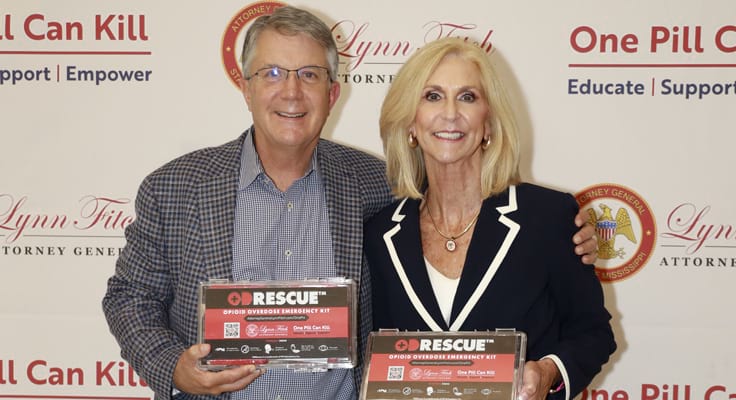Ken Trogdon, president of HarborPath — a nonprofit organization that has provided free life-saving medications to uninsured individuals in 24 states since 2012 — hopes to integrate his new overdose prevention On Campus program in all 16 universities in the Southeastern Conference (SEC) this year with the help of OD Rescue™.
“That’s probably very ambitious, but I never thought we would be here,” said Trogdon, reflecting on his initiative’s instant success last year at the University of Mississippi.
Trogdon calls it luck — picking the right school with the right student-athlete voice at the right time — but clearly something is resonating: the Ole Miss initiative received almost 700,000 social media impressions.
HarborPath On Campus works with colleges and universities to help students better understand and combat the ever-present dangers of fentanyl-laced counterfeit pills and their resulting overdoses of fentanyl poisoning. The overdose prevention program provides campuses with customized training programs and the distribution of FFF Enterprises, Inc.’s overdose kit called the ODRescue Box™ — a portable transparent box containing an adult/child CPR mask, a one-way valve with filter, nitrile gloves, an antiseptic wipe, and an area to place two boxes of naloxone.
Designed with experience-driven input from healthcare professionals, the ODRescue Box™ can be attached to a wall in high-traffic areas or conveniently transported in a backpack. The front cover highlights five common overdose symptoms. The back cover includes QR codes with links to training videos.
“Fentanyl is everywhere. It’s on every campus,” Trogdon said. “I am very committed to putting as many of these ODRescue Boxes on as many campuses as I can in 2025.”
“I am very committed to putting as many of these ODRescue Boxes on as many campuses as I can in 2025,” Trogdon said of his Hail Mary-like goal.
So far, the HarborPath On Campus program has received attention from Sports Illustrated, the Athletic, and the New York Times. Trogdon recently appeared on ESPN’s Paul Finebaum Show with the ODRescue Box™ to highlight the overdose problems impacting campuses nationwide.
“We know there is a high rate of underreported overdoses on college campuses,” Trogdon said. “Everyone knows drugs are on campus, but they don’t know the degree to which they’re ordering drugs. To have these boxes we can put in dorms … just gives us another way to tackle this issue.”
He will appear again on Finebaum’s live TV show early in 2025 to discuss the ongoing expansion of On Campus and feature an ODRescue Box™.
With Trogdon’s support, ODRescue Box™ is currently on the University of Mississippi and University of Arkansas campuses. Around 700 boxes are in community colleges and high-traffic areas throughout the state of Mississippi.
Currently, Trogdon is looking to get the University of Alabama on board. The support from what he sees as “the titan of college athletics” would drive the On Campus program to many more campuses in meaningful ways.
“We’re trying to save lives here,” Trogdon said about the HarborPath On Campus program.
Trogdon noted that the realities of the world now require readily accessible life-saving materials. Accessibility of the ODRescue Box™ was a natural fit for the On Campus program and will be for others looking to combat opioid overdoses in their communities. During an emergency, the ODRescue Box™ is easy to open and isn’t intimidating.
“I think for us they are tailor-made for college campuses. It is designed to contain naloxone. It can go on a wall. It’s like a fire extinguisher — every building needs to have one. Every building should have one,” he said.
Ultimately, Trogdon emphasized that the key to curbing the overdose problem is not only to create awareness through education but also to have immediate resources available to help prevent death.
The ODRescue Box™ makes naloxone products much more accessible. Backed by FFF Enterprises’ ultimate commitment to changing the course of overdose fatalities in the country, the ODRescue Box™ is an extension of FFF’s commitment to the community.
“I’m encouraged that this is resonating on college campuses,” he said. “We’re focused on one thing: how to save lives.”

